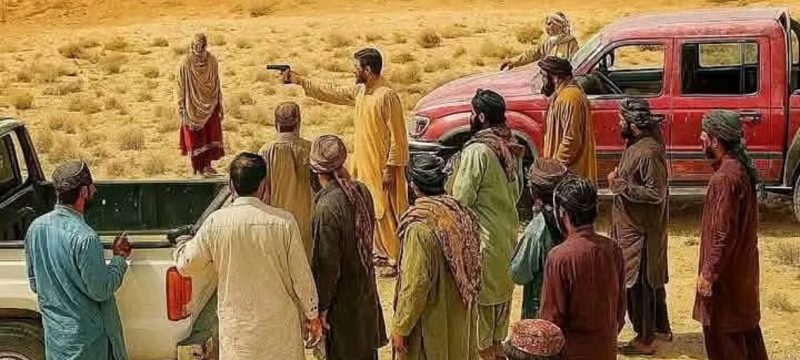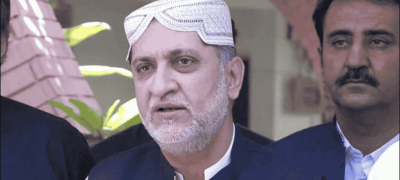Balochistan, a province in Pakistan, is known for its rich culture, diverse people, and beautiful landscapes. However, it is also a region where some old customs continue to govern life, even when they conflict with modern values. The recent incident in Balochistan has shocked the nation and raised serious questions about tribal justice, human rights, and the role of the state in protecting its citizens. In this blog, we will explore the details of the tragic event in Balochistan, its impact, and what needs to be done to prevent such incidents from happening again.
The Tragic Incident: A Young Couple’s Life Cut Short
On the morning of Sunday, July 21, 2025, a disturbing video surfaced on social media, sparking outrage and sadness across Pakistan. The video showed the execution of a young couple in Balochistan’s remote Hanna area. The couple, identified as 24-year-old Sheetal and 32-year-old Zarak, were both members of different Baloch tribes. They had married by choice, which went against the wishes of Sheetal’s family and certain tribal customs.
According to reports, the couple had returned to their village before Eid al-Adha in early June 2025. They were invited to what was initially thought to be a family gathering. However, this event turned out to be a tribal council meeting, where the elders of the community ruled that the couple had violated tribal traditions. The decision was brutal: the couple was sentenced to death.
The Brutality of Tribal Justice in Balochistan
In many parts of Balochistan, especially in remote areas, tribal customs still hold significant influence. Tribal councils, or “jirgas,” make decisions about everything from marriages to punishments. Unfortunately, these councils often operate outside the boundaries of the law, dispensing justice based on outdated practices. The incident involving Sheetal and Zarak is a chilling reminder of how these customs can override the rights and freedoms of individuals.
The video footage of the execution shows a horrific scene: Sheetal walking among several men before one of her male relatives shoots her in the head with a pistol. Zarak, her husband, was reportedly killed in a similar manner. The inhumanity of the act shocked the nation, with many people condemning the tribal justice system.
The Outrage and Demand for Justice
The video quickly spread across social media platforms, triggering a wave of grief, anger, and demands for justice. Pakistani citizens, human rights organizations, and politicians all condemned the killings. The Chief Minister of Balochistan, Sarfraz Bugti, confirmed the incident and assured the public that action would be taken. A case was registered under terrorism charges, and one suspect involved in the murder was arrested.
Shahid Rind, the spokesperson for the Balochistan government, stated, “All legal avenues will be pursued to ensure that those involved in the incident are punished in accordance with the demands of justice.” His statement reflected the government’s commitment to taking the matter seriously. However, many believe that this incident is not an isolated case but part of a larger problem rooted in tribal customs.
The Role of Tribal Councils in Balochistan
Tribal councils, or jirgas, are a traditional system of dispute resolution in Balochistan. These councils are usually composed of elders who have significant authority within their communities. In many cases, they are the ones who decide whether someone has broken the law or disrespected tribal customs. Unfortunately, these councils often apply harsh, outdated punishments, particularly for women.
For instance, women in some tribal areas of Balochistan may be punished for defying the expectations of their families or tribal leaders. These punishments can range from public humiliation to, as in this case, death. The practice is deeply rooted in patriarchal traditions, where the freedom of women is often restricted, and their rights are disregarded.
The Fight for Women’s Rights and Human Dignity
The tragic killing of Sheetal and Zarak highlights a pressing issue in Pakistan— the violation of human rights, particularly women’s rights. Denying individuals the freedom to marry whom they choose or punishing them for such personal decisions is a violation of their basic human dignity. The killing of the young couple is an example of how outdated tribal codes continue to take precedence over constitutional rights.
Senator Sherry Rehman, former ambassador to the United States and a prominent leader of the Pakistan People’s Party, condemned the killings in the strongest possible terms. She stated, “By killing the married couple in such a cruel way, the law and justice were insulted, and the authority of the provincial government was also challenged.” Rehman emphasized that denying someone the right to marry is a violation of their basic human rights and called for the perpetrators to be brought to justice.
The Role of Government in Addressing Tribal Practices
While the Balochistan government has taken steps to ensure that the perpetrators are punished, this incident raises serious questions about the effectiveness of the state’s laws in remote areas. Tribal councils often operate with little to no oversight from the government, making it difficult for individuals to seek justice. The government must step up its efforts to regulate these councils and ensure that their decisions align with the country’s laws, which guarantee the rights and freedoms of all citizens.
Moreover, there is a need for better education and awareness programs in rural areas to challenge these harmful traditions and encourage respect for human rights. The government should also ensure that women’s rights are protected and that they have the freedom to make decisions about their lives, including whom they marry.
Conclusion: The Need for Change in Balochistan
The heartbreaking execution of Sheetal and Zarak in Balochistan is a tragedy that has sparked national outrage. It highlights the ongoing struggle for human rights and justice in a region where tribal customs continue to overshadow the rule of law. While the government of Balochistan has promised to pursue justice, it is clear that more needs to be done to protect individuals from such brutal tribal punishments.
As a society, we must work together to challenge harmful traditions and ensure that the law is respected by all, regardless of tribal affiliation. The death of this young couple should serve as a wake-up call for all of us to take a stand against the violation of human rights and to push for a more just and fair society for everyone.
FAQs
1. What is the role of tribal councils in Balochistan?
Tribal councils, also known as jirgas, are groups of elders who make decisions on disputes within the community. These councils often enforce tribal customs, sometimes resulting in harsh punishments.
2. Why is tribal justice sometimes in conflict with the law?
Tribal justice operates independently of Pakistan’s legal system, and it often relies on outdated traditions that may violate human rights, particularly the rights of women.
3. What is being done to stop such incidents in Balochistan?
The Balochistan government has promised to take legal action against those responsible for the killings. However, there is also a need for long-term reforms to regulate tribal councils and protect human rights.
4. How can Pakistan protect women’s rights in remote areas?
Increasing awareness about women’s rights, providing education, and ensuring that government laws are enforced in all areas of the country are crucial steps toward protecting women’s freedoms.
5. What does this incident say about the state of justice in Balochistan?
The incident reflects the ongoing struggle to establish the rule of law in remote areas where tribal customs still hold great power, often leading to injustices.
In other news read more about CM Balochistan Clarifies Honor Killing Victims Were Not Married









